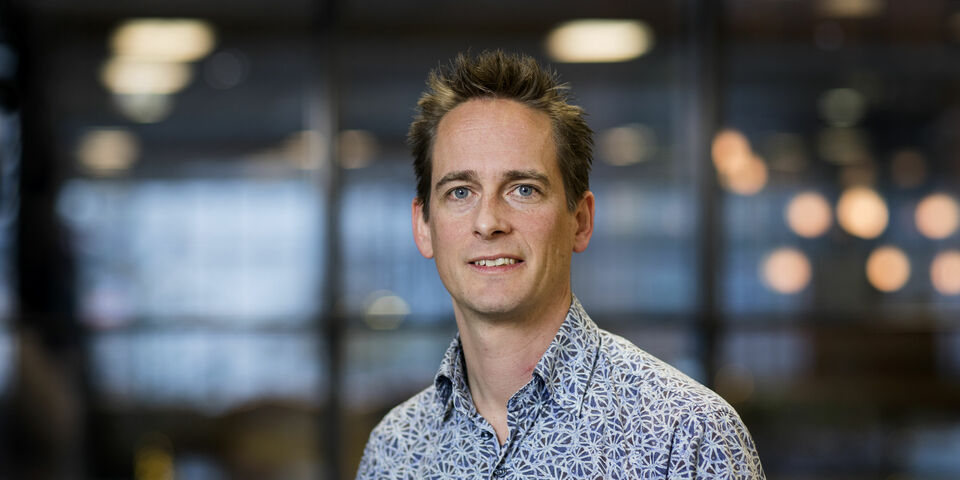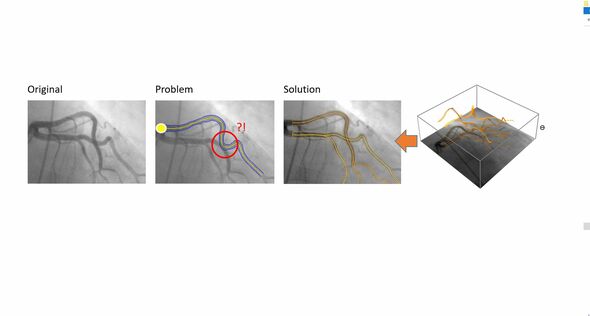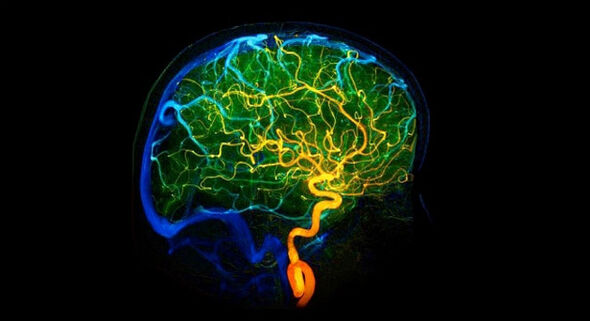Vici grant for mathematician Remco Duits
Mathematician Remco Duits has been awarded one of the largest personal academic grants in the Netherlands: the NWO Vici grant. Duits will use the 1.5 million euros he has been awarded to develop a better automatic image analysis method for enhancement and detection of complex vasculature in medical imaging. The grant is an investment in innovative research, and is intended for accomplished academics who want to establish their own research group.
Many medical images are assessed by computers. Often there are complex vascular structures in medical images, where blood vessels appear to be superimposed. Think, for example, of the blood vessels around the eyeball or near the heart. On a 2D X-ray, these vessels are often difficult to distinguish from each other. Automatic image analysis methods then sometimes wrongly connect blood vessels (see for example the middle picture below). A cardiologist navigating through a coronary artery with a catheter then runs the risk of not arriving at the site of, for example, the stenosis.
Remco Duits, a researcher at the Mathematics & Computer Science department, is building a new analysis method that solves such problems generically. He is doing this by combining advanced geometry (accounting for local orientations of a blood vessel) and machine learning in a geometric learning framework that is widely applicable to many image processing and classification tasks. Duits: "The problem with machine learning is the enormous quantity of training images and the complexity that the system needs, without accounting for roto-translation equivariance. The problem with geometric image analysis is that it cannot be applied automatically. If you combine the two, you get an automatic system with a high level of performance, little computational workload and without the need for too many training images and too large network complexity."
Combine
The Vici committee is very pleased with Duits' research proposal. They call the research " relevant and important". The committee is also "very positive about the fact that the research proposal combines aspects of (applied) mathematics, computer science and a range of applications."
Especially the fact that Duits already has collaborations with medical specialists, and is seen as an established partner, the committee sees as a big plus. Furthermore, the committee states in its evaluation report that "the candidate is a unique researcher with strong leadership skills and excellent results, who undoubtedly belongs in the Vici program."
Duits expresses his delight at his award and the accompanying excellent appreciations. "The grant enables the construction of a mathematical bridge between advanced differential geometry and applied deep learning methods. It thus provides deep geometric insight into neural networks and contributes to the improved analysis of complex blood vessels and to enhanced diagnosis of diseases such as diabetes and cancer. Thanks to this grant, I can build a new research team to develop new mathematical foundations for geometric learning and to realize crucial contributions to the applications.“, says Duits.
Delay
The announcement took a little longer this year due to the major hack at NWO, but today the science funder published the list of all new Vici winners. This highly coveted grant allows highly experienced researchers to develop an innovative line of research and build their own research group over a five-year period.
No fewer than 287 top scientists applied for a Vici grant in 2020 and 33 of them were awarded one. This brings the honor percentage to 11.5 percent. One-third of the applications were submitted by women. In the end, 13 female candidates (14 percent) and 20 male candidates (10 percent) were awarded scholarships.




Discussion